Student Assessment Workbook
Added on 2022-08-09
31 Pages9103 Words33 Views
Student Assessment Workbook
ASSIGNMENT COVER SHEET
Instructions:
Before you start your assessment task, please read the student declaration below.
All assignments must be submitted with this attached cover sheet.
Assignments submitted without this cover sheet or declaration completed, will be returned to the
student for resubmission.
Please keep a copy of your assignment. Your assignment will not be returned to you.
Please submit your assignment by hard copy or email the assignment cover sheet with your
assignment to assignment@alanakaye.edu.au
Email to assignment@alanakaye.edu.au
Qualification Code/Title CHC50113 Diploma of Early Childhood Education and Care
Competency Code/Title CHCECE021 Implement strategies for the inclusion of all children
Student Name
Student Email
Assessment start date
Assessment Due Date
Trainer Name Kim Smellin
Student Declaration
I confirm: Yes No
I understand the assessment requirements to achieve competence. ☐ ☐
I am ready for assessment. ☐ ☐
I understand the appeals, complaints and grievance procedure (refer to Student Handbook). ☐ ☐
(only complete if you have special needs). I have advised of my special needs and any changes to
the assessment process have been taken into consideration.
☐ ☐
The work in this assignment is my own work. I declare that this assessment item is my own work
unless otherwise acknowledged and referenced.
☐ ☐
I agree:
This assessment may be accessed by the government (Australian Skills Quality Authority,
Government Funding Agencies) or representatives chosen by Alana Kaye Training (eg. Trainers,
Consultant, Industry Representatives) to review the quality and marking of this assessment.
☐ ☐
I have read, understood and accept the above conditions of this assessment.
Signature: Date Submitted:
Cheating and plagiarism: All work submitted must be your own. If a trainer suspects that you have been involved in
plagiarism, the matter will be referred to the Branch Manager or CEO. If two students submit the same or very similar
assessment both students will need to resubmit their assessment.
tmp1ua7owwo3934018_386447669_1202093.docx Page 1 of 31
ASSIGNMENT COVER SHEET
Instructions:
Before you start your assessment task, please read the student declaration below.
All assignments must be submitted with this attached cover sheet.
Assignments submitted without this cover sheet or declaration completed, will be returned to the
student for resubmission.
Please keep a copy of your assignment. Your assignment will not be returned to you.
Please submit your assignment by hard copy or email the assignment cover sheet with your
assignment to assignment@alanakaye.edu.au
Email to assignment@alanakaye.edu.au
Qualification Code/Title CHC50113 Diploma of Early Childhood Education and Care
Competency Code/Title CHCECE021 Implement strategies for the inclusion of all children
Student Name
Student Email
Assessment start date
Assessment Due Date
Trainer Name Kim Smellin
Student Declaration
I confirm: Yes No
I understand the assessment requirements to achieve competence. ☐ ☐
I am ready for assessment. ☐ ☐
I understand the appeals, complaints and grievance procedure (refer to Student Handbook). ☐ ☐
(only complete if you have special needs). I have advised of my special needs and any changes to
the assessment process have been taken into consideration.
☐ ☐
The work in this assignment is my own work. I declare that this assessment item is my own work
unless otherwise acknowledged and referenced.
☐ ☐
I agree:
This assessment may be accessed by the government (Australian Skills Quality Authority,
Government Funding Agencies) or representatives chosen by Alana Kaye Training (eg. Trainers,
Consultant, Industry Representatives) to review the quality and marking of this assessment.
☐ ☐
I have read, understood and accept the above conditions of this assessment.
Signature: Date Submitted:
Cheating and plagiarism: All work submitted must be your own. If a trainer suspects that you have been involved in
plagiarism, the matter will be referred to the Branch Manager or CEO. If two students submit the same or very similar
assessment both students will need to resubmit their assessment.
tmp1ua7owwo3934018_386447669_1202093.docx Page 1 of 31
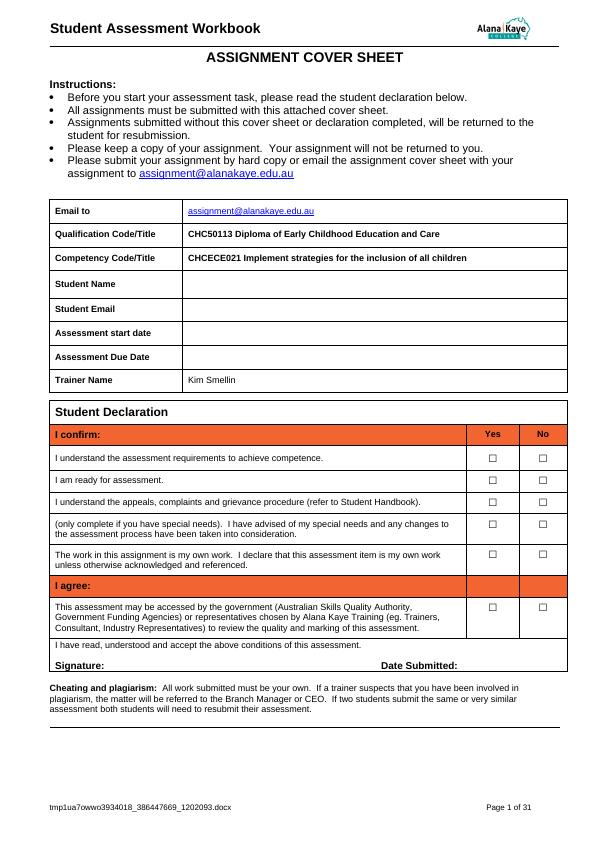
Student Assessment Workbook
This page has been left blank intentionally
tmp1ua7owwo3934018_386447669_1202093.docx Page 2 of 31
This page has been left blank intentionally
tmp1ua7owwo3934018_386447669_1202093.docx Page 2 of 31
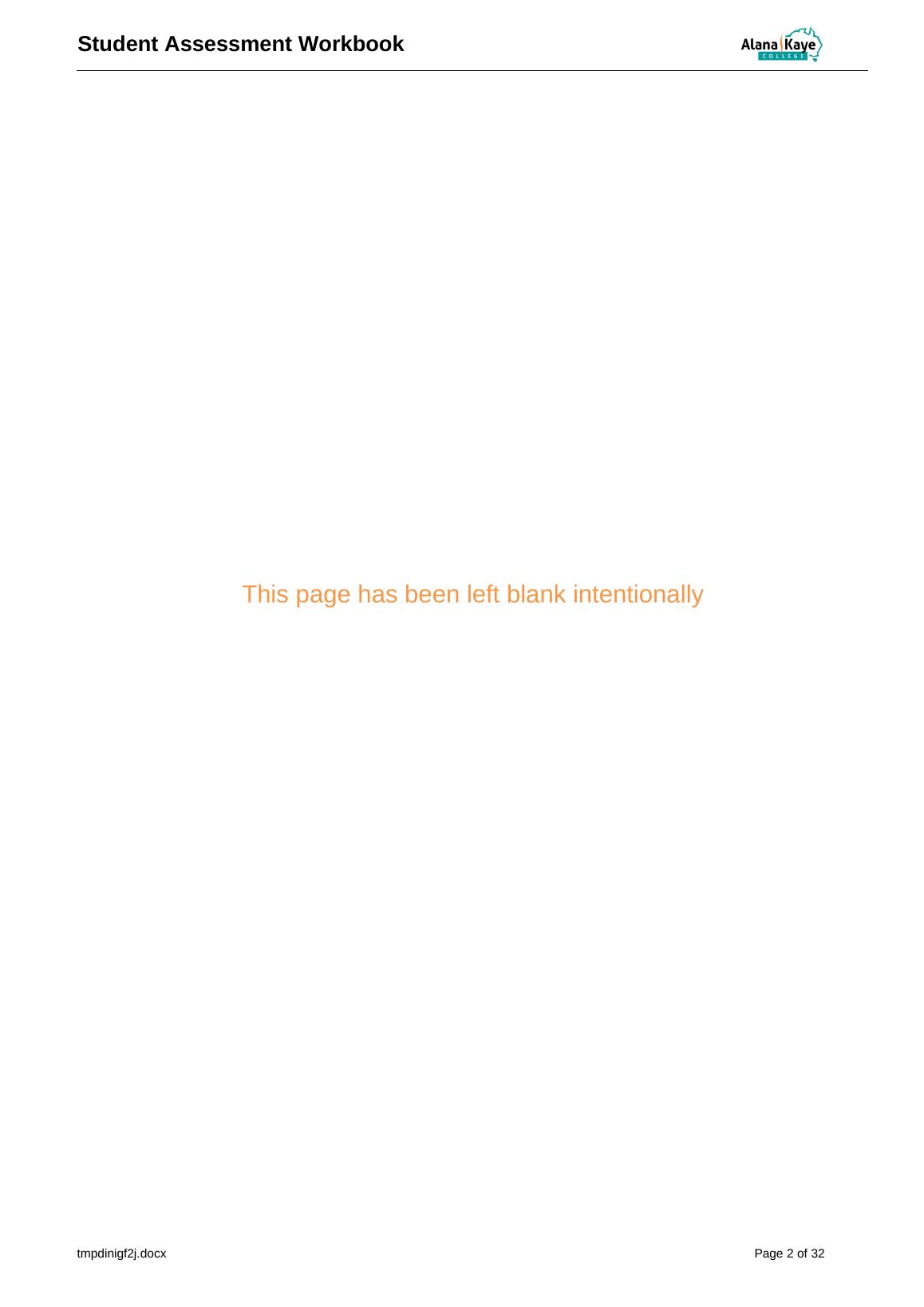
Student Assessment Workbook
COMPETENCY JUDGEMENT – TRAINER/ASSESSOR USE ONLY
Instructions:
This document is used by the Assessor to record their feedback about your assessment.
This competency judgement record will be returned to you. If you do not agree with the judgement,
students can access Alana Kaye’s complaints and appeals process.
Qualification Code/Title CHC50113 Diploma of Early Childhood Education and Care
Competency Code/Title CHCECE021 Implement strategies for the inclusion of all children
Student Name
Assessor Name
STUDENTS MUST NOT COMPLETE THE FOLLOWING FEEDBACK – ASSESSOR ONLY
ASSESSOR’S FEEBACK TO STUDENT
(include resubmission requirements and due date, if applicable)
Assessment Task Result (S = satisfactory; NS = not yet satisfactory) S NS
Assessment Task 1 - Promoting inclusion
Assessment Task 2 - Respecting diversity
Assessment Task 3 - Identifying children with barriers to learning
Assessment Task 4 - Developing a plan for support and inclusion
Assessment Task 5 - Implementing strategies to meet the child’s additional needs
Assessment Task 6 - Monitoring and reviewing strategies
Feedback
Assessment Task 7 – Workplace tasks
Feedback
Assessment Task 8 – Project
Questions 1- 12
Feedback
Overall Assessor Comments:
Final assessment result: Resubmission result:
☐ COMPETENT ☐ COMPETENT
☐ NOT YET COMPETENT ☐ NOT YET COMPETENT
Assessor Name
Assessor Signature Date
Administration Resulted
VETtrak & tracking spreadsheet updated
ACS & CJ scanned & saved
Copy sent to student
Initial:
Date:
tmp1ua7owwo3934018_386447669_1202093.docx 3
COMPETENCY JUDGEMENT – TRAINER/ASSESSOR USE ONLY
Instructions:
This document is used by the Assessor to record their feedback about your assessment.
This competency judgement record will be returned to you. If you do not agree with the judgement,
students can access Alana Kaye’s complaints and appeals process.
Qualification Code/Title CHC50113 Diploma of Early Childhood Education and Care
Competency Code/Title CHCECE021 Implement strategies for the inclusion of all children
Student Name
Assessor Name
STUDENTS MUST NOT COMPLETE THE FOLLOWING FEEDBACK – ASSESSOR ONLY
ASSESSOR’S FEEBACK TO STUDENT
(include resubmission requirements and due date, if applicable)
Assessment Task Result (S = satisfactory; NS = not yet satisfactory) S NS
Assessment Task 1 - Promoting inclusion
Assessment Task 2 - Respecting diversity
Assessment Task 3 - Identifying children with barriers to learning
Assessment Task 4 - Developing a plan for support and inclusion
Assessment Task 5 - Implementing strategies to meet the child’s additional needs
Assessment Task 6 - Monitoring and reviewing strategies
Feedback
Assessment Task 7 – Workplace tasks
Feedback
Assessment Task 8 – Project
Questions 1- 12
Feedback
Overall Assessor Comments:
Final assessment result: Resubmission result:
☐ COMPETENT ☐ COMPETENT
☐ NOT YET COMPETENT ☐ NOT YET COMPETENT
Assessor Name
Assessor Signature Date
Administration Resulted
VETtrak & tracking spreadsheet updated
ACS & CJ scanned & saved
Copy sent to student
Initial:
Date:
tmp1ua7owwo3934018_386447669_1202093.docx 3
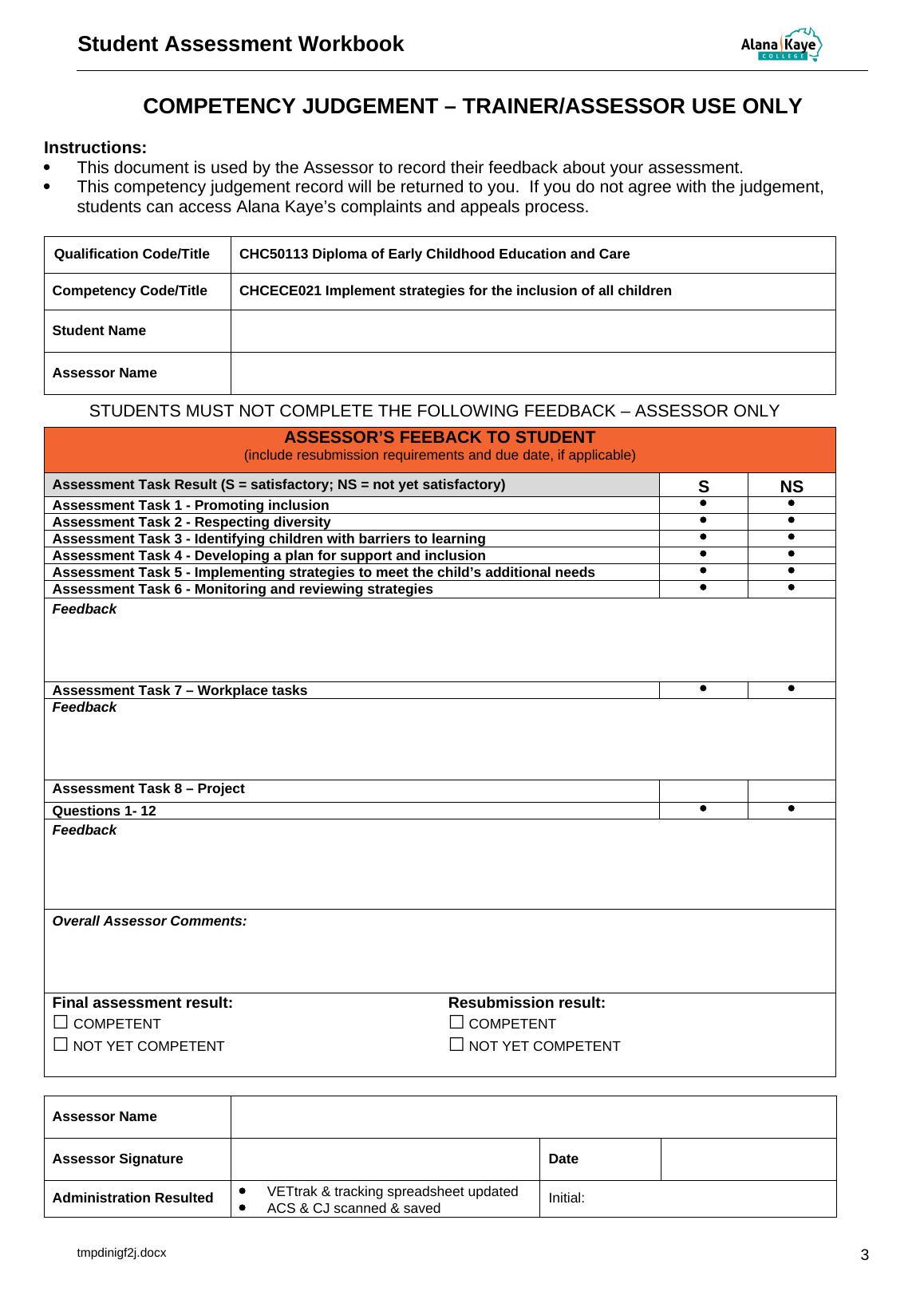
Student Assessment Workbook
CHCECE021 Implement strategies for the inclusion of all children
This document comprises of 2 sections:
Section One – Unit and Assessment Overview
Section Two – Assessment Tasks
Section One – Unit and Assessment Overview provides you with an overview of the knowledge and skills that you need to
demonstrate in the assessment tasks. The Unit and Assessment Overview also provides you with information about the
assessment conditions, the topics covered in this unit, the Assessor’s role, changes to the assessment procedure that can be
made to accommodate your needs and instructions to students including how to submit your assessment tasks.
Section Two – Assessment Tasks consists of questions, case studies and work based activities. These tasks are used to
demonstrate that you meet the requirements as detailed in Section One – Unit and Assessment Overview.
PART ONE: UNIT AND ASSESSMENT OVERVIEW
Performance Evidence
The candidate must show evidence of the ability to complete tasks outlined in elements and performance criteria of this unit,
manage tasks and manage contingencies in the context of the job role. There must be demonstrated evidence that the
candidate has completed the following tasks:
developed and implemented a plan for support and inclusion for at least one child, including:
contributing to individualised, child-centred planning and service delivery
collaborating and sharing information with family and other educators to develop and implement an inclusion plan
investigating and trialling strategies to address the needs of the child
reviewing and suggesting adaptations to service delivery to meet the needs of children with special needs
identifying and assessing the additional needs of individual children
gathering additional resources or sources of information to assist in developing and adapting curriculum to meet
additional needs.
Knowledge Evidence
The candidate must be able to demonstrate essential knowledge required to effectively do the task outlined in elements and
performance criteria of this unit, manage the task and manage contingencies in the context of the work role. These include
knowledge of:
how to access:
the National Quality Framework
the National Quality Standards
the relevant approved learning framework
and how to navigate through framework and standards documents to find areas relevant to this unit of competency
relevant legislation, regulations and workplace practices
range of additional needs that may be identified and the implications for the role of the educator, including:
behavioural or psychological disorders
child at risk of harm or illness
family circumstances and needs
health problems
physical, sensory or developmental disability
strategies that encourage participation
understanding of different backgrounds, experiences and needs of children and families in exceptional
circumstances or with additional needs
organisation standards, policies and procedures.
Assessment Conditions
Skills must be demonstrated in a regulated education and care service. In addition, simulations and scenarios must be used
where the full range of contexts and situations cannot be provided in the workplace or may occur only rarely. These are
situations relating to emergency or unplanned procedures where assessment in these circumstances would be unsafe or is
impractical.
Simulated assessment environments must simulate the real-life working environment where these skills and knowledge would
be performed, with all the relevant equipment and resources of that working environment.
Assessment must ensure use of:
National Quality Framework for Early Childhood Education and Care
the relevant approved learning framework under the National Quality Framework for Early Childhood Education and
Care.
tmp1ua7owwo3934018_386447669_1202093.docx 4
CHCECE021 Implement strategies for the inclusion of all children
This document comprises of 2 sections:
Section One – Unit and Assessment Overview
Section Two – Assessment Tasks
Section One – Unit and Assessment Overview provides you with an overview of the knowledge and skills that you need to
demonstrate in the assessment tasks. The Unit and Assessment Overview also provides you with information about the
assessment conditions, the topics covered in this unit, the Assessor’s role, changes to the assessment procedure that can be
made to accommodate your needs and instructions to students including how to submit your assessment tasks.
Section Two – Assessment Tasks consists of questions, case studies and work based activities. These tasks are used to
demonstrate that you meet the requirements as detailed in Section One – Unit and Assessment Overview.
PART ONE: UNIT AND ASSESSMENT OVERVIEW
Performance Evidence
The candidate must show evidence of the ability to complete tasks outlined in elements and performance criteria of this unit,
manage tasks and manage contingencies in the context of the job role. There must be demonstrated evidence that the
candidate has completed the following tasks:
developed and implemented a plan for support and inclusion for at least one child, including:
contributing to individualised, child-centred planning and service delivery
collaborating and sharing information with family and other educators to develop and implement an inclusion plan
investigating and trialling strategies to address the needs of the child
reviewing and suggesting adaptations to service delivery to meet the needs of children with special needs
identifying and assessing the additional needs of individual children
gathering additional resources or sources of information to assist in developing and adapting curriculum to meet
additional needs.
Knowledge Evidence
The candidate must be able to demonstrate essential knowledge required to effectively do the task outlined in elements and
performance criteria of this unit, manage the task and manage contingencies in the context of the work role. These include
knowledge of:
how to access:
the National Quality Framework
the National Quality Standards
the relevant approved learning framework
and how to navigate through framework and standards documents to find areas relevant to this unit of competency
relevant legislation, regulations and workplace practices
range of additional needs that may be identified and the implications for the role of the educator, including:
behavioural or psychological disorders
child at risk of harm or illness
family circumstances and needs
health problems
physical, sensory or developmental disability
strategies that encourage participation
understanding of different backgrounds, experiences and needs of children and families in exceptional
circumstances or with additional needs
organisation standards, policies and procedures.
Assessment Conditions
Skills must be demonstrated in a regulated education and care service. In addition, simulations and scenarios must be used
where the full range of contexts and situations cannot be provided in the workplace or may occur only rarely. These are
situations relating to emergency or unplanned procedures where assessment in these circumstances would be unsafe or is
impractical.
Simulated assessment environments must simulate the real-life working environment where these skills and knowledge would
be performed, with all the relevant equipment and resources of that working environment.
Assessment must ensure use of:
National Quality Framework for Early Childhood Education and Care
the relevant approved learning framework under the National Quality Framework for Early Childhood Education and
Care.
tmp1ua7owwo3934018_386447669_1202093.docx 4
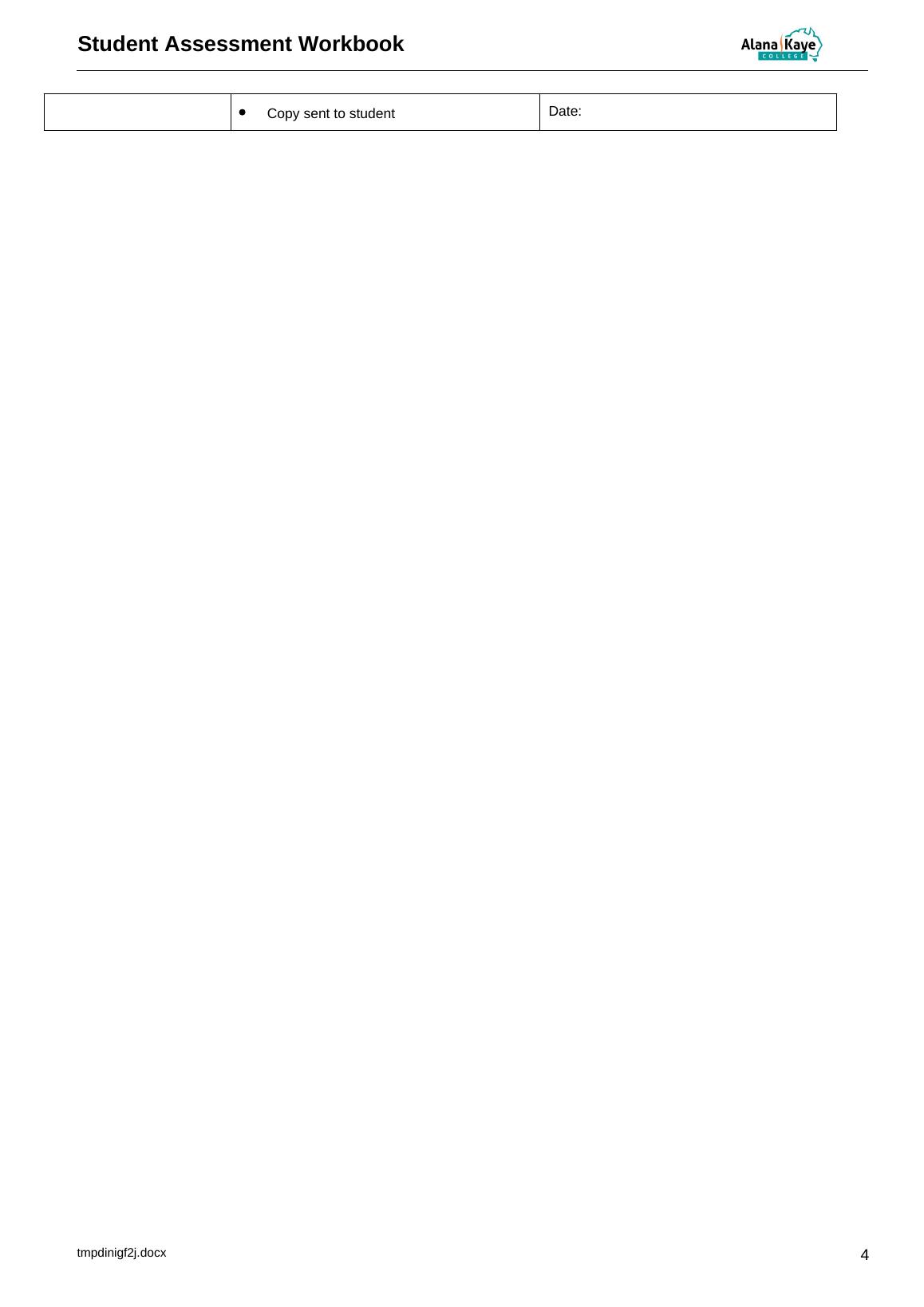
Student Assessment Workbook
Assessors must satisfy the Standards for Registered Training Organisations (RTOs) 2015/AQTF mandatory competency
requirements for assessors.
Topics Covered
The topics covered in this unit include:
Establishing and applying limits and guidelines for behaviour
Identifying and reviewing behaviour as required
Developing a plan to guide a child’s behaviour where required
Implementing and monitoring a behaviour plan
Additional reference material and research website
If you need to refer to a specific resource to complete your assessment task, we will identify the resource within the assessment
task. Additional resources that you may find useful include:
www.earlychildhoodaustralia.org.au
www.ecareconciliationsymposium.com.au
www.education.gov.au/early-years-learning-framework
www.aussiechildcarenetwork.com.au
www.ccccnsw.org.au/wp-content/uploads/EYLF_Ed_Guide_Dec2010.pdf
Reasonable Adjustments
Your Assessor may be able to make adjustments to your assessment based on special needs you may have or if you are a
distance learning student. Please ask your Trainer if you feel that modifications to this assessment are required.
Student Handbook
Please refer to Alana Kaye’s Student Handbook about:
Educational and Student Support Services
Trainer Support
Assessment Strategy
Appeals, Complaints and Grievances Procedures
Role of the Trainer/Assessor
Your Trainer/Assessor will:
answer any questions you might have about the assessment
negotiate assessment activities if reasonable adjustment is required
inform you of any variations to the assessment which may be required if you have any special needs or if you are a
distance based learner
assess your competency by making judgements about the evidenced presented in line with the rules of evidence: validity,
authenticity, currency and sufficiency
give you feedback on the outcomes of the assessment process
counsel you on the outcomes of the assessment including advising you of your right of appeal if you disagree with the
assessment decision
help you address the work health and safety requirements of the assessment setting, if appropriate.
Instructions for students
In order to successfully meet the requirements of this unit you are required to undertake all assessment tasks. Each of these
assessment tasks may have a series of activities or questions that you are required to complete.
Please note that at Diploma level it is expected that the questions will be answered in a manner that reflects significant
understanding of the theory associated with the unit of competency. You are required to elaborate upon the answer sufficiently
articulating your understating of the underpinning knowledge required for this unit of competency.
As a guide – each question will generally require 1 - 2 paragraphs to effectively address requirements. In some cases, this may
be more. If you, in the course of answering a question, rely upon a text, document, webpage or other source of information, you
must make reference to where this information came from.
You are required to submit:
Student Assessment Workbook – this workbook needs to be submitted by the due date identified on your timetable.
Please refer to the Student Work Placement Guidelines for instructions about your work placement. This includes the
assessment requirements of this qualification including:
Student Work Placement Third Party Report
tmp1ua7owwo3934018_386447669_1202093.docx 5
Assessors must satisfy the Standards for Registered Training Organisations (RTOs) 2015/AQTF mandatory competency
requirements for assessors.
Topics Covered
The topics covered in this unit include:
Establishing and applying limits and guidelines for behaviour
Identifying and reviewing behaviour as required
Developing a plan to guide a child’s behaviour where required
Implementing and monitoring a behaviour plan
Additional reference material and research website
If you need to refer to a specific resource to complete your assessment task, we will identify the resource within the assessment
task. Additional resources that you may find useful include:
www.earlychildhoodaustralia.org.au
www.ecareconciliationsymposium.com.au
www.education.gov.au/early-years-learning-framework
www.aussiechildcarenetwork.com.au
www.ccccnsw.org.au/wp-content/uploads/EYLF_Ed_Guide_Dec2010.pdf
Reasonable Adjustments
Your Assessor may be able to make adjustments to your assessment based on special needs you may have or if you are a
distance learning student. Please ask your Trainer if you feel that modifications to this assessment are required.
Student Handbook
Please refer to Alana Kaye’s Student Handbook about:
Educational and Student Support Services
Trainer Support
Assessment Strategy
Appeals, Complaints and Grievances Procedures
Role of the Trainer/Assessor
Your Trainer/Assessor will:
answer any questions you might have about the assessment
negotiate assessment activities if reasonable adjustment is required
inform you of any variations to the assessment which may be required if you have any special needs or if you are a
distance based learner
assess your competency by making judgements about the evidenced presented in line with the rules of evidence: validity,
authenticity, currency and sufficiency
give you feedback on the outcomes of the assessment process
counsel you on the outcomes of the assessment including advising you of your right of appeal if you disagree with the
assessment decision
help you address the work health and safety requirements of the assessment setting, if appropriate.
Instructions for students
In order to successfully meet the requirements of this unit you are required to undertake all assessment tasks. Each of these
assessment tasks may have a series of activities or questions that you are required to complete.
Please note that at Diploma level it is expected that the questions will be answered in a manner that reflects significant
understanding of the theory associated with the unit of competency. You are required to elaborate upon the answer sufficiently
articulating your understating of the underpinning knowledge required for this unit of competency.
As a guide – each question will generally require 1 - 2 paragraphs to effectively address requirements. In some cases, this may
be more. If you, in the course of answering a question, rely upon a text, document, webpage or other source of information, you
must make reference to where this information came from.
You are required to submit:
Student Assessment Workbook – this workbook needs to be submitted by the due date identified on your timetable.
Please refer to the Student Work Placement Guidelines for instructions about your work placement. This includes the
assessment requirements of this qualification including:
Student Work Placement Third Party Report
tmp1ua7owwo3934018_386447669_1202093.docx 5
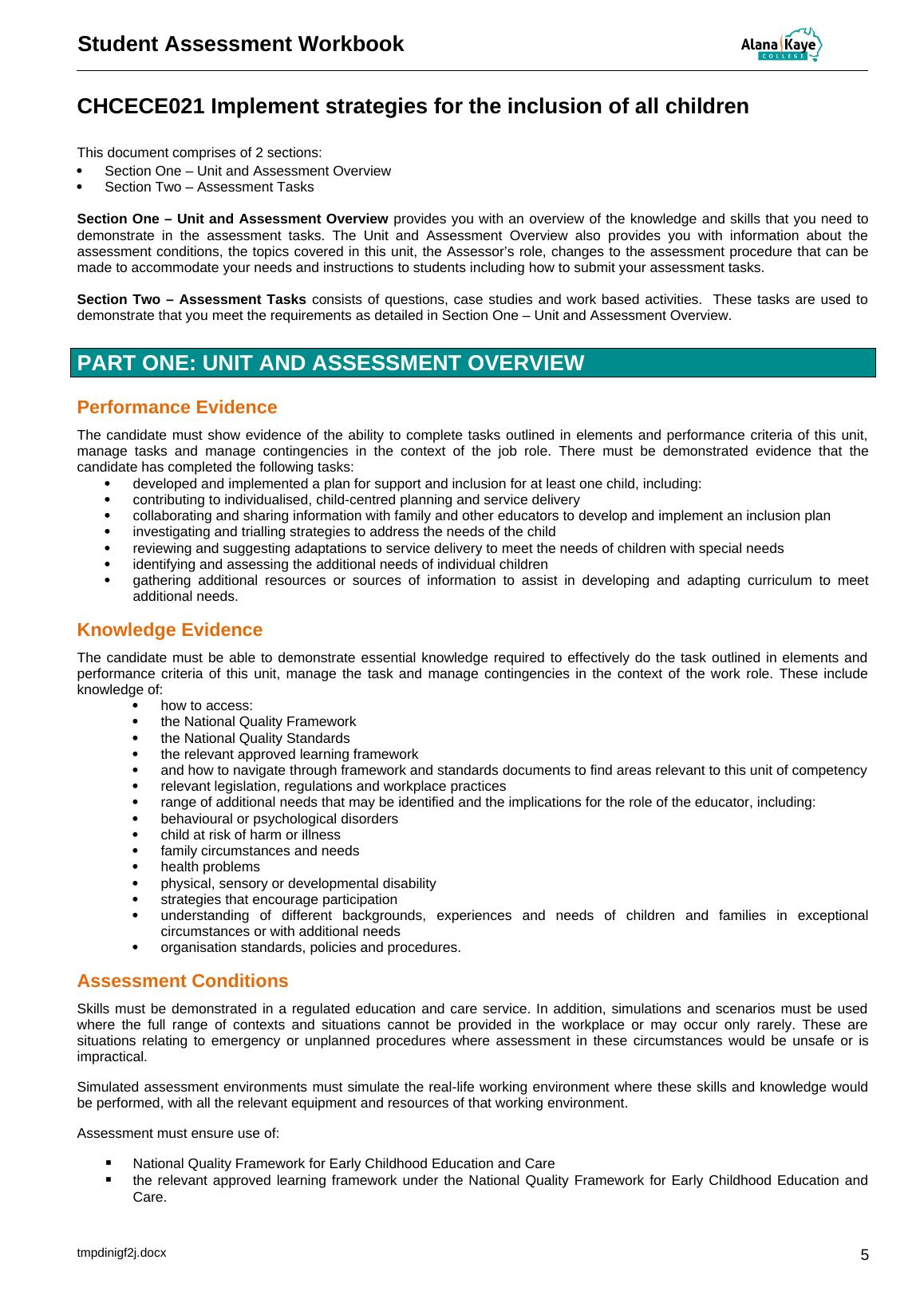
Student Assessment Workbook
Student Workplace Logbook and Learning Activities or letter of tenure to demonstrate the minimum 240 hours of mandatory
work placement.
Submitting your Assessment and Due Dates
Your Trainer will advise you of the due date for each assessment. Please submit your assessment by the due date. The process
for submitting assessments is provided on the assignment coversheet on page 1 of this document.
Feedback on your Assessment
Your Trainer will mark your assessment within 4 weeks of submission. Your Trainer will provide you with feedback about your
assessment. Your result for the Student Assessment Workbook will either be:
Satisfactory – you have successfully passed the workbook requirements OR
Not Satisfactory – you are not yet satisfactory.
If your result is ‘Not Satisfactory’ you will be given an opportunity to improve your assessment. Your Trainer will inform you of
the skill or knowledge gaps in your assessment. You will need to resubmit your assessment with the corrections or redo the
practical exercise until you achieve the ‘Satisfactory’ result. Any student who plagiarises or cheats will be given a ‘Not
Satisfactory’ result and will be required to resubmit their assessment again and may also be required to answer verbal
questions.
Once you have completed both the Student Assessment Workbook and the work placement assessment requirements your
results will be either:
Competency Achieved – you passed OR
Not Yet Competent.
Work Placement Guidelines
All students are required to complete 240 hours of work placement in a regulated education and care service, students must
have a minimum Diploma trained staff member supervising them throughout the 240 hours.
Students need to be aware that Family Day Care can only be used as a work placement setting if the Family Day Care
supervising them holds a Diploma and there are at least 3 different children aged 0-2 and 3 different children aged 2-6 enrolled
on the same day. School Aged Care settings are not accepted as work placement settings for this course.
The CHC50113 Diploma of Early Childhood Education and Care includes a mandatory work placement of 240 hours to cover
the range of activities as outlined in the evidence requirements of the following units:
CHCECE003 Provide care for children (if not completed in Certificate III)
CHCECE005 Provide care for babies and toddlers (if not completed in Certificate III)
CHCECE007 Develop positive and respectful relationships with children (if not completed in Certificate III)
CHCECE010 Support the holistic development of children in early childhood (if not completed in Certificate III)
CHCECE017 Foster the holistic development and wellbeing of the child in early childhood
CHCECE019 Facilitate compliance in an education and care service (min 120)
CHCECE024 Design and implement the curriculum to foster children’s learning and development
Supplementary Evidence
Competence in this unit also requires further supplementary evidence. If a Candidate is working within a child care facility they
will be required to provide a Third Party Report and Third Party Evidence Collection Agreement from a suitably qualified
member of staff plus an Alana Kaye Assessor will be required to complete a workplace visit and observe the candidate in the
completion of their tasks.
Working with Children card (Ochre card) NT
It is mandatory for people who have contact or potential contact with children in certain specified areas of employment to hold a
Working with Children Clearance Notice. States and Territories may have different requirements and it is best to check.
For further information on NT requirements contact: Email: safent.police@pfes.nt.gov.au
Phone: Freecall: 1800 SAFE NT (1800 72 33 68 - Australia wide callers only) or (08) 8985 8985
Complaints and Appeals Procedures
Alana Kaye has a Quality Management System documenting any appeals or complaints to ensure they are addressed efficiently
and effectively. Should you wish to lodge an appeal or complaint in relation to your assessment, please follow the Complaints
and Appeals procedure detailed in the Student Handbook. In the first instance, we encourage you talk with your Trainer.
PART TWO: ASSESSMENT TASKS
tmp1ua7owwo3934018_386447669_1202093.docx 6
Student Workplace Logbook and Learning Activities or letter of tenure to demonstrate the minimum 240 hours of mandatory
work placement.
Submitting your Assessment and Due Dates
Your Trainer will advise you of the due date for each assessment. Please submit your assessment by the due date. The process
for submitting assessments is provided on the assignment coversheet on page 1 of this document.
Feedback on your Assessment
Your Trainer will mark your assessment within 4 weeks of submission. Your Trainer will provide you with feedback about your
assessment. Your result for the Student Assessment Workbook will either be:
Satisfactory – you have successfully passed the workbook requirements OR
Not Satisfactory – you are not yet satisfactory.
If your result is ‘Not Satisfactory’ you will be given an opportunity to improve your assessment. Your Trainer will inform you of
the skill or knowledge gaps in your assessment. You will need to resubmit your assessment with the corrections or redo the
practical exercise until you achieve the ‘Satisfactory’ result. Any student who plagiarises or cheats will be given a ‘Not
Satisfactory’ result and will be required to resubmit their assessment again and may also be required to answer verbal
questions.
Once you have completed both the Student Assessment Workbook and the work placement assessment requirements your
results will be either:
Competency Achieved – you passed OR
Not Yet Competent.
Work Placement Guidelines
All students are required to complete 240 hours of work placement in a regulated education and care service, students must
have a minimum Diploma trained staff member supervising them throughout the 240 hours.
Students need to be aware that Family Day Care can only be used as a work placement setting if the Family Day Care
supervising them holds a Diploma and there are at least 3 different children aged 0-2 and 3 different children aged 2-6 enrolled
on the same day. School Aged Care settings are not accepted as work placement settings for this course.
The CHC50113 Diploma of Early Childhood Education and Care includes a mandatory work placement of 240 hours to cover
the range of activities as outlined in the evidence requirements of the following units:
CHCECE003 Provide care for children (if not completed in Certificate III)
CHCECE005 Provide care for babies and toddlers (if not completed in Certificate III)
CHCECE007 Develop positive and respectful relationships with children (if not completed in Certificate III)
CHCECE010 Support the holistic development of children in early childhood (if not completed in Certificate III)
CHCECE017 Foster the holistic development and wellbeing of the child in early childhood
CHCECE019 Facilitate compliance in an education and care service (min 120)
CHCECE024 Design and implement the curriculum to foster children’s learning and development
Supplementary Evidence
Competence in this unit also requires further supplementary evidence. If a Candidate is working within a child care facility they
will be required to provide a Third Party Report and Third Party Evidence Collection Agreement from a suitably qualified
member of staff plus an Alana Kaye Assessor will be required to complete a workplace visit and observe the candidate in the
completion of their tasks.
Working with Children card (Ochre card) NT
It is mandatory for people who have contact or potential contact with children in certain specified areas of employment to hold a
Working with Children Clearance Notice. States and Territories may have different requirements and it is best to check.
For further information on NT requirements contact: Email: safent.police@pfes.nt.gov.au
Phone: Freecall: 1800 SAFE NT (1800 72 33 68 - Australia wide callers only) or (08) 8985 8985
Complaints and Appeals Procedures
Alana Kaye has a Quality Management System documenting any appeals or complaints to ensure they are addressed efficiently
and effectively. Should you wish to lodge an appeal or complaint in relation to your assessment, please follow the Complaints
and Appeals procedure detailed in the Student Handbook. In the first instance, we encourage you talk with your Trainer.
PART TWO: ASSESSMENT TASKS
tmp1ua7owwo3934018_386447669_1202093.docx 6
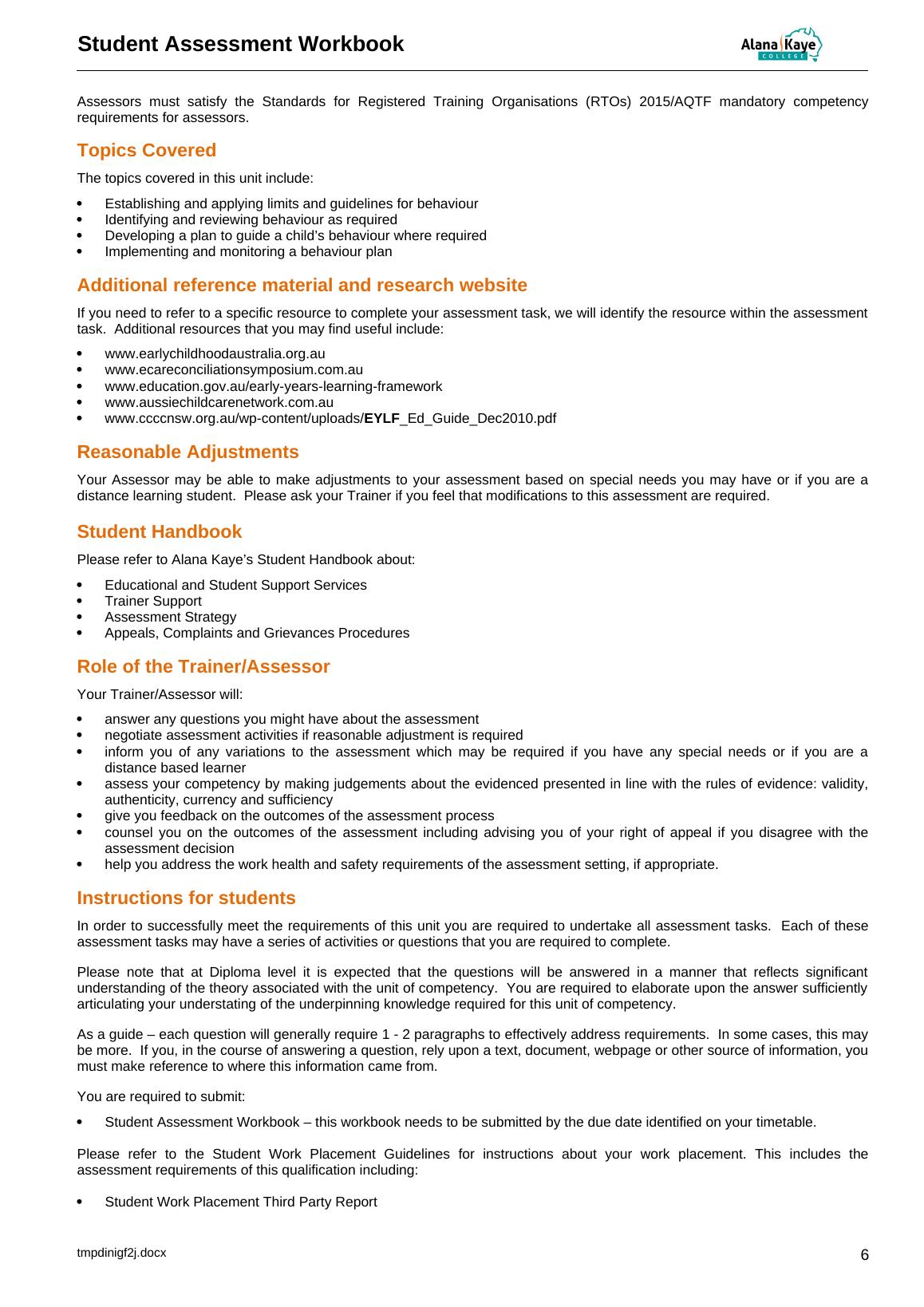
Student Assessment Workbook
Before you commence this assessment, please read the student declaration on the front page. It is
important that you are ready for assessment and understand the assessment process. Please speak
with your Trainer if you have any questions.
Assessment Task 1
Promoting inclusion
Purpose
This assessment task is designed to assess your skills and knowledge in promoting inclusion.
Requirements
To complete this assessment task, you need:
access to a children’s services environment
to answer the questions and submit responses as directed by your trainer/assessor/training
organisation
access to the Early Years Learning Framework and the United Nations Convention on the Rights of
the Child.
It is essential that you promote inclusion. To do so you must:
make curriculum decisions that promote participation
demonstrate actions that assist, support and encourage children to participate
interact with families and children in ways that show you believe in their capacity to succeed
work with others within and outside of your service to develop your professional knowledge of
people with different needs.
The following are some people and services that can support you to do these things:
Families of children with additional support needs
Educational leaders
Professional Support Coordinators (PSCs)
Inclusion Support Agencies (ISAs)
Services within the community that specialise in supporting children with specific additional
support needs
1. Explain and provide evidence to show how each of these people and services assist you to
promote inclusion. You might provide evidence such as:
documents
pamphlets, leaflets or flyers
website addresses
notes from discussions
points based on your knowledge.
Families of children with additional support needs help promote inclusivity by informing the
educators how to take care of their children effectively. Thereby they also make contributions to
curriculum development where helping the children with additional support by actively engaging
with them becomes a part of the daily activities in the centre.
Educational leaders promote inclusion in early childhood setting by sharing their knowledge of
the importance and relevance of inclusion of all children in daily activities, irrespective of their
personal nuances.
tmp1ua7owwo3934018_386447669_1202093.docx 7
Before you commence this assessment, please read the student declaration on the front page. It is
important that you are ready for assessment and understand the assessment process. Please speak
with your Trainer if you have any questions.
Assessment Task 1
Promoting inclusion
Purpose
This assessment task is designed to assess your skills and knowledge in promoting inclusion.
Requirements
To complete this assessment task, you need:
access to a children’s services environment
to answer the questions and submit responses as directed by your trainer/assessor/training
organisation
access to the Early Years Learning Framework and the United Nations Convention on the Rights of
the Child.
It is essential that you promote inclusion. To do so you must:
make curriculum decisions that promote participation
demonstrate actions that assist, support and encourage children to participate
interact with families and children in ways that show you believe in their capacity to succeed
work with others within and outside of your service to develop your professional knowledge of
people with different needs.
The following are some people and services that can support you to do these things:
Families of children with additional support needs
Educational leaders
Professional Support Coordinators (PSCs)
Inclusion Support Agencies (ISAs)
Services within the community that specialise in supporting children with specific additional
support needs
1. Explain and provide evidence to show how each of these people and services assist you to
promote inclusion. You might provide evidence such as:
documents
pamphlets, leaflets or flyers
website addresses
notes from discussions
points based on your knowledge.
Families of children with additional support needs help promote inclusivity by informing the
educators how to take care of their children effectively. Thereby they also make contributions to
curriculum development where helping the children with additional support by actively engaging
with them becomes a part of the daily activities in the centre.
Educational leaders promote inclusion in early childhood setting by sharing their knowledge of
the importance and relevance of inclusion of all children in daily activities, irrespective of their
personal nuances.
tmp1ua7owwo3934018_386447669_1202093.docx 7
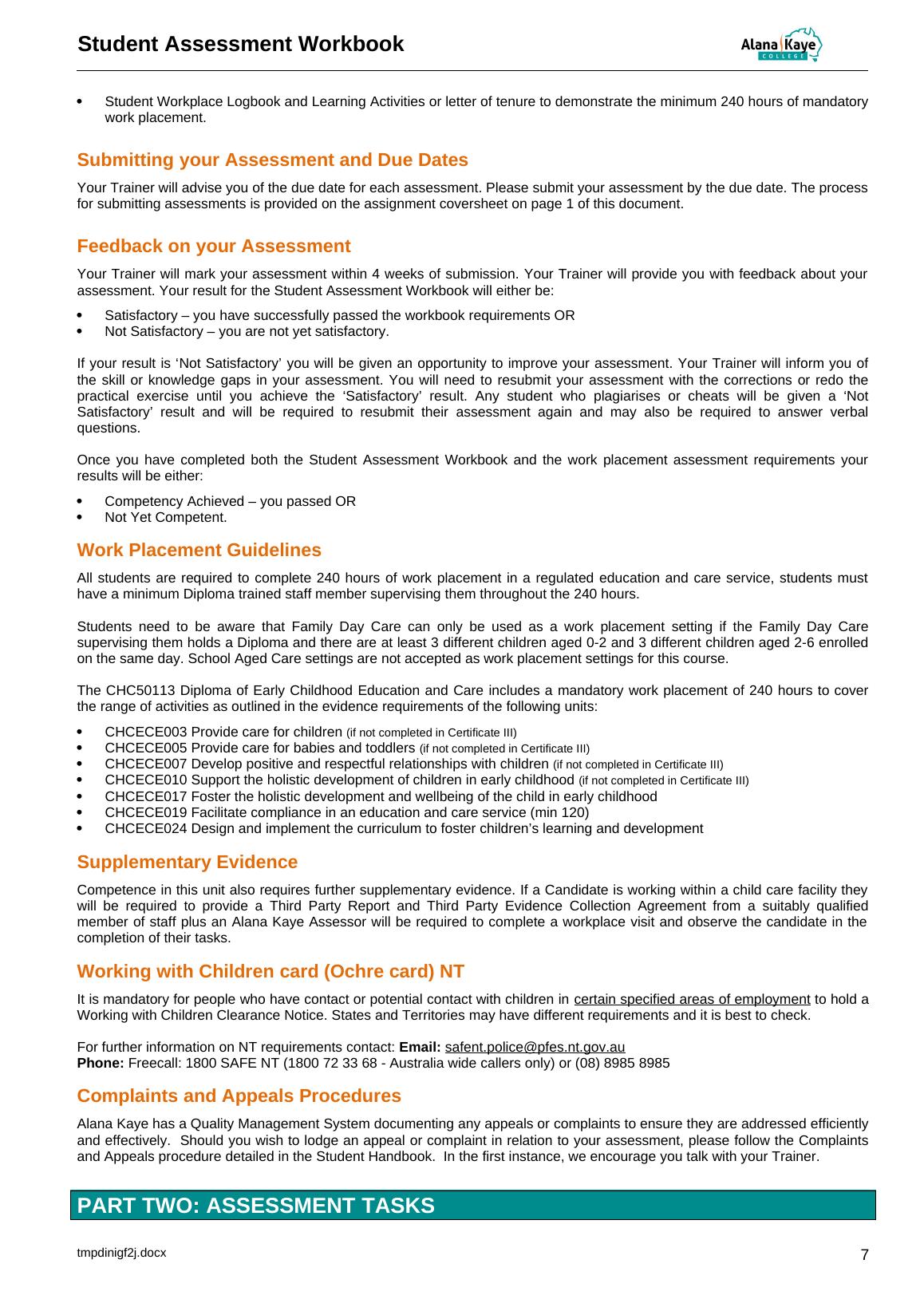
Student Assessment Workbook
Professional support coordinators assist in promoting inclusion by providing customised training
and mentoring to the professionals involved in the childcare profession.
Inclusive support agencies help the professional early childhood services to be able to
effectively provide support and promote inclusive activities in the early childhood centre so that
all children can engage together irrespective of their differences, to collectively meet their
learning outcomes.
The services within the community that specialise in supporting children with specific additional
support, assist us in promoting inclusivity by taking each child with special needs into
consideration and amending segments of the curriculum to fit them in the activities. At the same
time, they also help develop resources and materials tailored to incorporate all children together.
2. Reflect on UNICEF’s The right to participation (www.unicef.org/crc/files/Right-to-Participation.pdf)
and the United Nations Convention on the Rights of the Child. Explain how your service
philosophy, policies and procedures link to this international legislation. Discuss:
inclusion, equity and diversity
the need for understanding different backgrounds, experiences, and needs of families in
exceptional circumstances or with additional needs
The United Nations Convention on the Rights of The Child is an international legislation that upholds
the children’s rights as much as the rights of all adult human beings. Similarly, the Right to Participation
supports the notion of equal school and educational participation for all children, irrespective of their
individual differences.
The service links to this international legislation by actively promoting the inclusion of all children in all
the activities and not discriminating against a child based on his / her individual differences. In terms of
inclusion, equity and diversity, the service follows the philosophy of no child left behind, and promotes
active learning and educational goals of the children in an inclusive and respectful manner.
In order to promote that level of inclusivity, the service also attempts to understand the background and
needs of each child in a highly detailed manner. This involves constant sessions with the parents and
families of the children, especially those with special needs.
3. Link the principles of inclusion and participation to a Principle, Practice and Outcome of the Early
Years Learning Framework.
Principle: Respect for diversity.
Practice: Cultural Competence
tmp1ua7owwo3934018_386447669_1202093.docx 8
Professional support coordinators assist in promoting inclusion by providing customised training
and mentoring to the professionals involved in the childcare profession.
Inclusive support agencies help the professional early childhood services to be able to
effectively provide support and promote inclusive activities in the early childhood centre so that
all children can engage together irrespective of their differences, to collectively meet their
learning outcomes.
The services within the community that specialise in supporting children with specific additional
support, assist us in promoting inclusivity by taking each child with special needs into
consideration and amending segments of the curriculum to fit them in the activities. At the same
time, they also help develop resources and materials tailored to incorporate all children together.
2. Reflect on UNICEF’s The right to participation (www.unicef.org/crc/files/Right-to-Participation.pdf)
and the United Nations Convention on the Rights of the Child. Explain how your service
philosophy, policies and procedures link to this international legislation. Discuss:
inclusion, equity and diversity
the need for understanding different backgrounds, experiences, and needs of families in
exceptional circumstances or with additional needs
The United Nations Convention on the Rights of The Child is an international legislation that upholds
the children’s rights as much as the rights of all adult human beings. Similarly, the Right to Participation
supports the notion of equal school and educational participation for all children, irrespective of their
individual differences.
The service links to this international legislation by actively promoting the inclusion of all children in all
the activities and not discriminating against a child based on his / her individual differences. In terms of
inclusion, equity and diversity, the service follows the philosophy of no child left behind, and promotes
active learning and educational goals of the children in an inclusive and respectful manner.
In order to promote that level of inclusivity, the service also attempts to understand the background and
needs of each child in a highly detailed manner. This involves constant sessions with the parents and
families of the children, especially those with special needs.
3. Link the principles of inclusion and participation to a Principle, Practice and Outcome of the Early
Years Learning Framework.
Principle: Respect for diversity.
Practice: Cultural Competence
tmp1ua7owwo3934018_386447669_1202093.docx 8
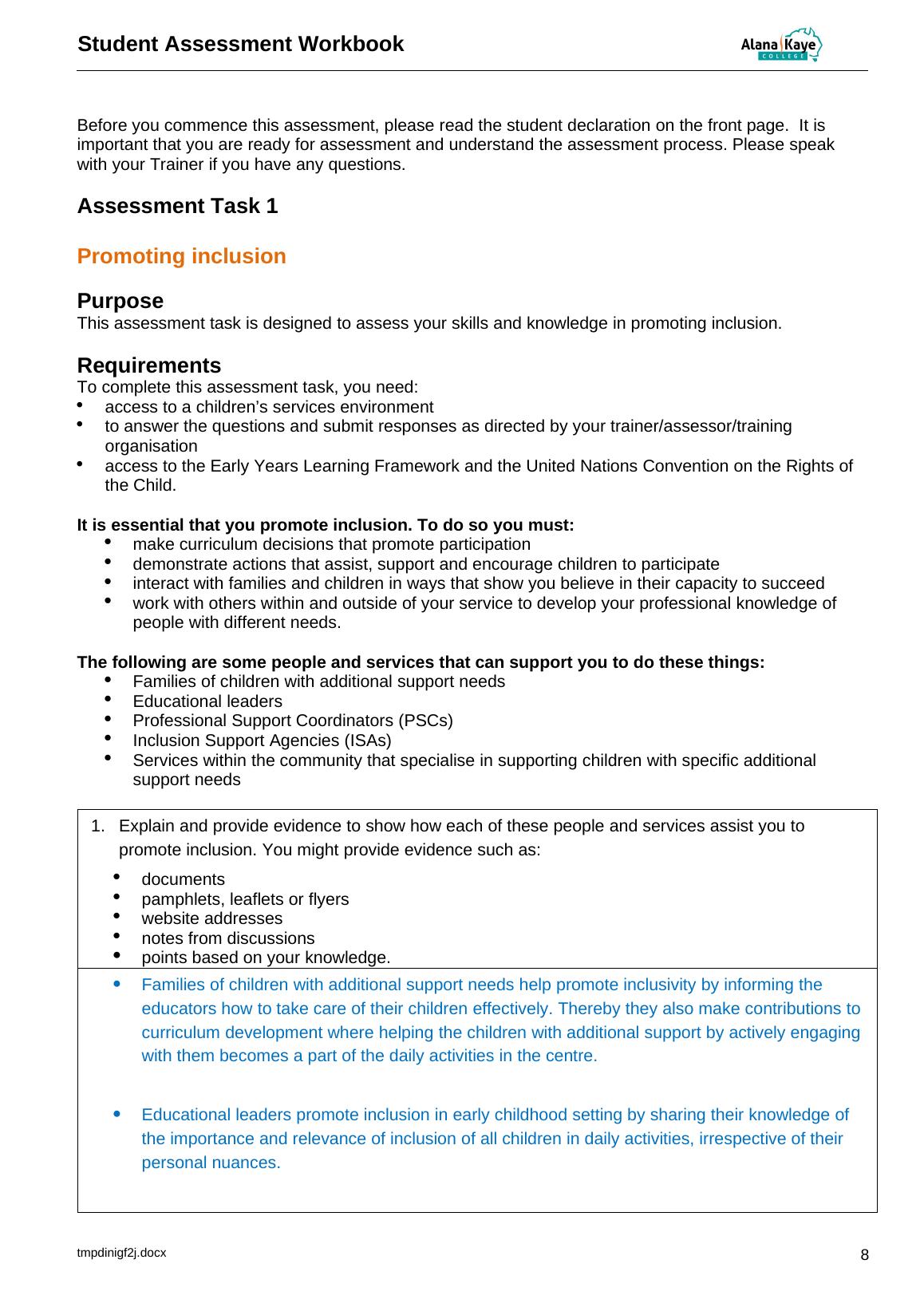
End of preview
Want to access all the pages? Upload your documents or become a member.
Related Documents
CHCECE017 Foster the holistic development and wellbeing of the child in early childhoodlg...
|36
|9275
|483
Student Assessment Workbooklg...
|29
|10642
|48
A European Comparative Studylg...
|42
|10528
|24
Student Assessment Workbook And Projectlg...
|35
|10002
|18
CHCECE024 Design and Implement Curriculum for Children's Learning and Developmentlg...
|29
|8708
|202
CHCECE023: Analyse Information to Inform Learning (Core Unit) Assessmentlg...
|34
|9885
|48
